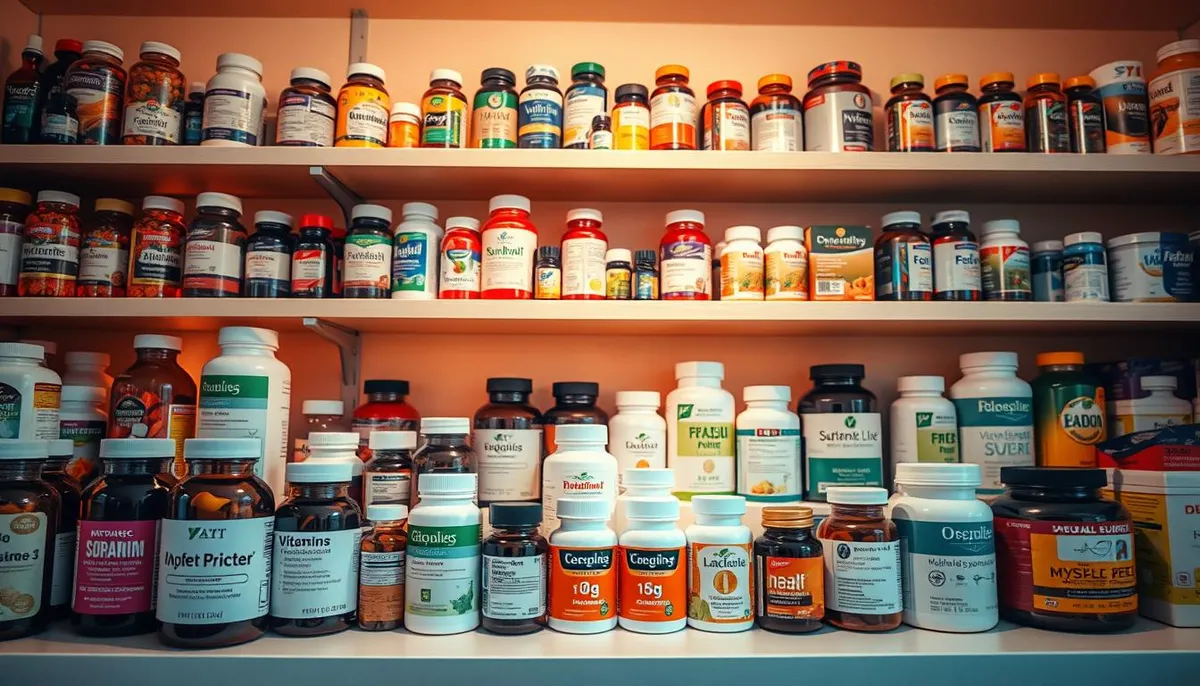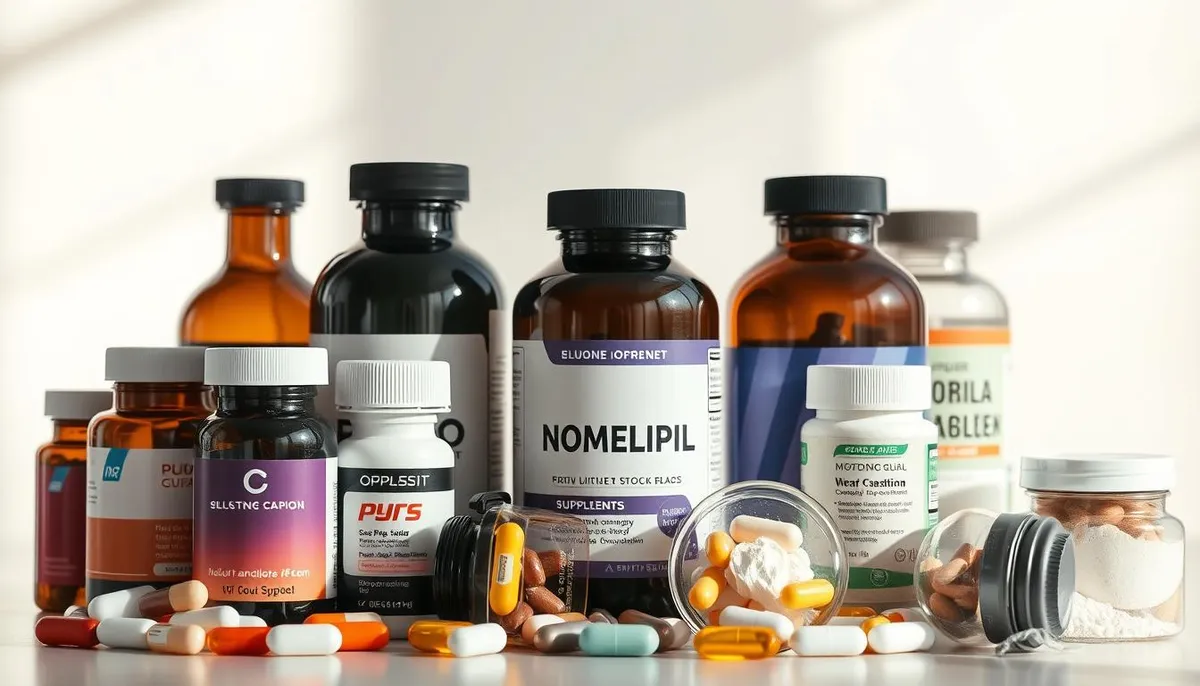Have you ever looked at that bottle of vitamins in your cabinet and wondered if they’re still effective? You’re not alone. Many health-conscious people share this common concern about their nutritional products.
Understanding supplement potency is essential for anyone committed to maintaining their wellness routine. While these products don’t “expire” like food, their effectiveness does change over time.

Vitamins and other nutritional compounds gradually break down, losing their potency. This means you might not get the full nutritional support you expect from older products.
This guide will walk you through everything about supplement longevity. You’ll learn about expiration dates, proper storage techniques, and when to replace your products.
Knowing when to refresh your supply ensures you’re truly supporting your health goals. You’ll avoid wasting money on ineffective vitamins and maximize your wellness investment.
We’ll provide practical, science-backed information to help you make smart choices. These decisions connect to the broader goal of living a healthier, longer life through informed product selection.
Key Takeaways
- Supplements lose potency gradually rather than expiring suddenly
- Proper storage significantly extends product effectiveness
- Expiration dates indicate potency levels, not safety concerns
- Regularly rotating your supply ensures maximum benefits
- Understanding shelf life prevents wasted money on ineffective products
- Different supplement types have varying longevity timelines
- Storage conditions dramatically impact vitamin preservation
Understanding Supplement Shelf Life
Many people don’t realize that the vitamins they take today might not deliver the same benefits next year. The concept of shelf life revolves around maintaining product effectiveness over time.
The Concept of Potency Over Time
Supplement potency refers to the strength of active ingredients. These compounds naturally break down through a process called degradation. A bottle labeled with 100% daily value might contain significantly less months later.
Certain nutrients lose potency faster than others. Research shows vitamin C, vitamin K, and vitamin B1 degrade more quickly. Understanding this helps you maximize your health investment.
Insights from FDA Guidelines and Manufacturer Practices
The Food and Drug Administration regulates dietary supplements as food, not drugs. This explains why expiration dates aren’t mandated like prescription medications.
While the FDA doesn’t require dates, responsible supplement manufacturers provide “best before” labels based on stability testing. The typical shelf life for most vitamins is approximately two years from manufacture.
Manufacturers who offer expiration dates and third-party testing demonstrate commitment to quality. This transparency helps consumers make informed choices about their nutritional products.
How Long Are Supplements Good For
When determining the usable lifespan of your health products, multiple variables come into play. Most nutritional items maintain their effectiveness for approximately two years from manufacture when stored correctly. However, this timeframe can vary significantly based on several factors.
Factors Influencing Supplement Longevity
Environmental conditions dramatically affect your products’ shelf life. Extreme temperatures, both hot and cold, can cause chemical changes in active ingredients. Light exposure, especially direct sunlight, breaks down certain compounds like vitamin A and D.
Oxygen exposure accelerates oxidation processes that reduce potency. This explains why unopened bottles typically maintain their strength longer. Proper storage conditions are essential for maximizing the time your products remain effective.

Differences Between Chewable, Tablet, and Gummy Forms
The physical form of your nutritional products significantly impacts their durability. Tablet vitamins typically offer the longest shelf life, often remaining potent for several years. Their compressed nature provides better protection against environmental factors.
Chewable varieties have a shorter lifespan due to increased moisture absorption. Gummy forms generally degrade fastest because they contain additional ingredients like gelatin and sweeteners. Understanding these differences helps you make informed purchasing decisions based on your usage patterns.
Choosing tablet forms makes sense when buying larger quantities that will last months. This knowledge ensures you get maximum value from your wellness investment while maintaining product effectiveness.
Optimal Storage and Preservation Tips
Proper storage conditions can significantly extend the lifespan and potency of your health supplements. Where you store vitamins directly impacts their effectiveness over time. Creating the right environment ensures you get maximum value from your wellness investment.
Establishing a Cool, Dry, and Light-Protected Environment
The ideal spot for your nutritional products is a dry place away from direct sunlight. A linen closet or bedroom drawer works perfectly. These areas maintain stable temperature and protect against light exposure.
Always keep your vitamins in their original containers. Manufacturers design this packaging to shield against moisture and air. The label provides essential information about proper storage requirements.
Avoiding Common Storage Pitfalls in Kitchens and Bathrooms
Many people mistakenly keep their supplements on the counter or in the kitchen cabinet. This exposes them to heat from cooking appliances. The constant temperature changes accelerate ingredient breakdown.
The bathroom is another problematic location. Steam from showers creates humidity that damages product quality. Moisture absorption reduces potency much faster than proper storage would allow.
When and How to Use Refrigeration for Sensitive Supplements
Some products benefit from refrigeration to maintain freshness. Fish oil supplements are prime candidates for cooler storage. Probiotics and certain oils also stay potent longer when chilled.
Always check product instructions before refrigerating. Not all vitamins require cold storage. When in doubt, consult the manufacturer’s guidelines for specific recommendations.
| Storage Location | Temperature Stability | Humidity Level | Light Exposure | Recommended For |
|---|---|---|---|---|
| Bedroom Drawer | Excellent | Low | None | Most vitamins and supplements |
| Kitchen Cabinet | Poor | Medium-High | Variable | Not recommended |
| Bathroom Medicine Cabinet | Poor | High | Low | Avoid for supplement storage |
| Refrigerator | Excellent | Low | None | Fish oil, probiotics, sensitive formulas |
Assessing the Risks of Consuming Expired Supplements
The decision to consume nutritional products past their labeled dates requires understanding both safety and efficacy concerns. Many people wonder if it’s safe to take expired vitamins, and the answer is generally reassuring.

Unlike spoiled food, expired vitamin supplements don’t become toxic or dangerous. There are no documented cases of illness from taking expired nutritional products. The real concern involves effectiveness rather than safety.
Loss of Nutrient Potency and Effectiveness
The primary risk of consuming outdated products is reduced potency. Over time, the active ingredients break down, meaning you might not get the nutrient levels you expect.
This becomes particularly important for people with specific dietary needs. Someone following a vegan diet relying on B12 supplements could develop deficiencies if taking expired products. During pregnancy, expired folic acid may not provide adequate folate for fetal development.
Recognizing Physical Signs of Degradation
Physical changes indicate when products have degraded beyond use. Look for unusual odors, color changes, or visible mold. Any clumping or texture alterations also signal it’s time to replace your vitamins.
These visual cues help you make informed decisions about product safety. When in doubt, it’s better to err on the side of caution and purchase fresh nutritional products.
| Condition | Appearance | Safety Level | Recommended Action |
|---|---|---|---|
| Recently expired | Normal color and texture | Generally safe | Monitor effectiveness |
| Long expired | Slight color change | Reduced potency | Consider replacement |
| Visible degradation | Mold, clumping, odor | Not recommended | Dispose immediately |
While expired vitamins are typically safe to take, they represent wasted money if potency has diminished. Regular rotation ensures you receive maximum nutritional benefits from your investment.
Proper Disposal and Environmental Considerations
Completing your supplement journey responsibly involves proper disposal of expired products. This final step protects your household and our planet. Thoughtful practices ensure both safety and environmental stewardship.
FDA-Recommended Methods for Safe Disposal
The Food and Drug Administration provides clear guidance for disposing of expired vitamins. Never toss loose products directly into your trash. This prevents accidental exposure by children or pets.
Follow this simple FDA method for safe disposal at home. Mix your expired vitamins with used coffee grounds or cat litter. Place the mixture in a sealed bag before placing it in household waste.
Avoid flushing these items down the toilet. This practice can lead to water contamination. It introduces unnecessary compounds into aquatic ecosystems.
Minimizing Environmental Impact Through Responsible Practices
Take-back programs offer the ideal solution for disposal. Many pharmacies and communities provide drop-off locations. Some programs even accept mail-in returns for convenience.
Search online for local hazardous waste facilities in your area. These centers handle nutritional products safely. They ensure proper processing of packaging and ingredients.
Responsible disposal reflects a commitment to holistic wellness. You ensure maximum health benefits from fresh products while minimizing environmental waste. This approach supports both personal and planetary health.
Integrating Longevity Strategies with Premium Supplements
Maximizing your healthspan requires more than just understanding expiration dates. It involves selecting nutritional products that maintain their potency and align with comprehensive wellness approaches.
Visionaries like Blueprint Bryan Johnson demonstrate that optimizing every health detail matters. This includes choosing premium nutritional items from quality-focused manufacturers.
Insights Inspired by Blueprint Bryan Johnson’s Approach
Third-party verification marks like the USP seal indicate rigorous testing. Military research shows many medications remain effective years beyond dates. This reliability becomes crucial for long-term health strategies.
Premium options often feature superior ingredient sourcing and stability formulations. They deliver consistent nutrient levels throughout their usable period. This consistency supports wellness goals over decades.
How Premium Supplements Support a Healthier, Longer Life
Investing in high-quality products makes financial sense when considering extended effectiveness. You actually receive the nutritional value you pay for throughout the product’s life.
View your regimen as part of a holistic diet and lifestyle strategy. Platforms like https://longevity-supplement.com connect people to cutting-edge health insights. They offer premium nutritional items designed for long-term wellness.
Start your journey toward a longer, healthier life today. Sign up at https://longevity-supplement.com for innovative health strategies and quality nutritional products.
Conclusion
Every bottle in your cabinet represents an opportunity to optimize your long-term wellness strategy. Managing your nutritional products effectively ensures you receive maximum benefits from your health investment.
While these products don’t become dangerous after their expiration date, they gradually lose potency. Most maintain effectiveness for about two years when stored properly. Regular label checks and timely replacement guarantee you get the nutrient support you expect.
This practical knowledge connects directly to broader health and life goals. Choosing quality supplements and managing them wisely demonstrates commitment to your wellness journey. You’re investing in your future vitality with every smart decision.
Take control of your health strategy today. Visit https://longevity-supplement.com for premium products and cutting-edge insights that support your commitment to a healthier, longer life.
FAQ
Do vitamins and supplements really expire?
Yes, they do. The expiration date on the bottle is the manufacturer’s guarantee of full potency. Over time, ingredients can break down, and the product may lose its effectiveness. The Food and Drug Administration (FDA) requires that supplement manufacturers provide a date until which the product meets its quality standards.
Is it safe to take expired vitamins?
Taking expired vitamins is generally not considered dangerous, but they are likely less effective. The main risk is a loss of nutrient potency, meaning you might not get the full benefit listed on the label. It’s best to avoid using products that show physical signs of degradation.
What is the typical shelf life for most supplements?
Most dietary supplements have a shelf life of about two to three years from the date of manufacture. However, this can vary greatly. Factors like the form (tablet, capsule, or chewable gummy), specific ingredients, and packaging all influence how long a product remains at its peak quality.
How should I store my supplements to maximize their lifespan?
Always store vitamins in a cool, dry place away from direct light and heat. A kitchen cabinet away from the stove or a bedroom drawer is ideal. Avoid storing them in a bathroom or on a kitchen counter where moisture and temperature changes are common, as this can shorten their shelf life.
Are some supplement forms, like fish oil or gummies, more perishable?
Absolutely. Certain products are more sensitive. Fish oil can oxidize and become rancid. Chewable or gummy vitamins often contain moisture, making them more prone to mold or texture changes. For these, paying close attention to the expiration date and proper storage is especially important.
What is the best way to dispose of old supplements?
The FDA recommends mixing the expired supplement with an unappealing substance like used coffee grounds or kitty litter in a sealed plastic bag before throwing it in the trash. This helps prevent accidental ingestion by children or pets. Do not flush them down the toilet.
RelatedRelated articles



